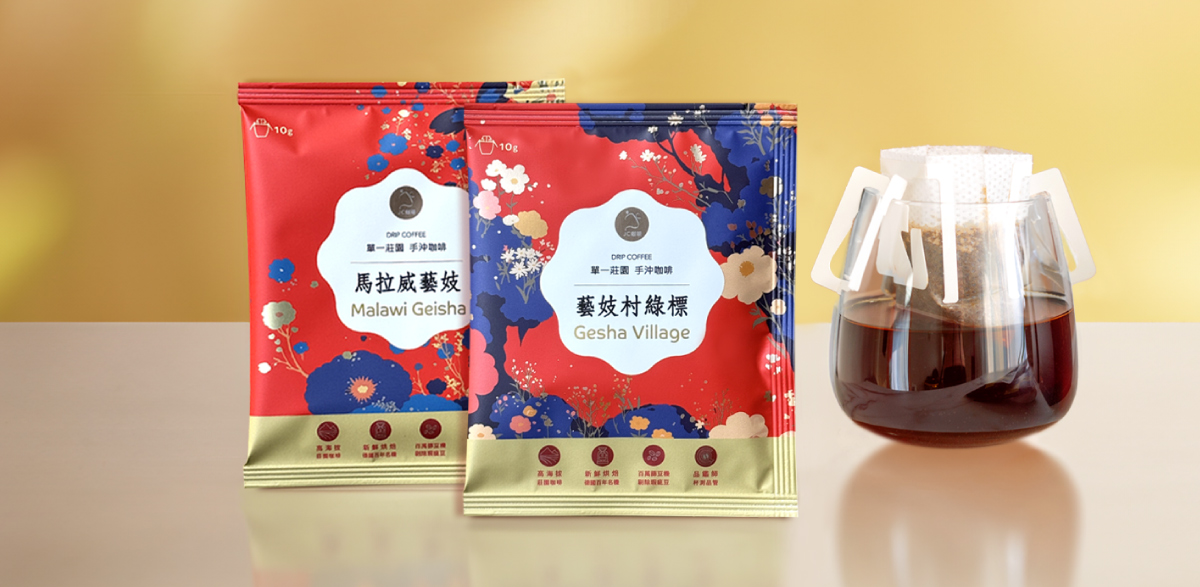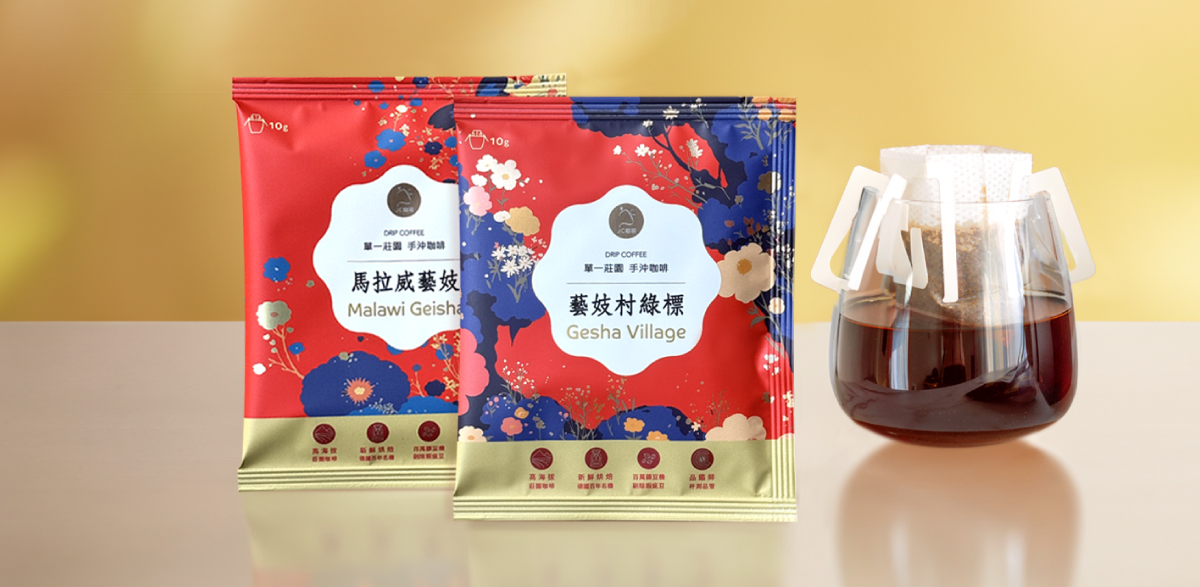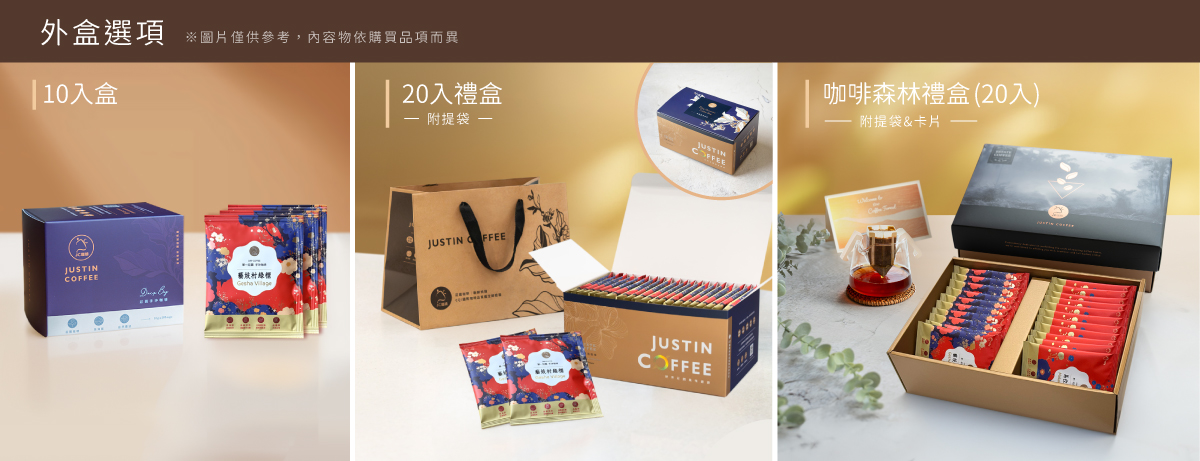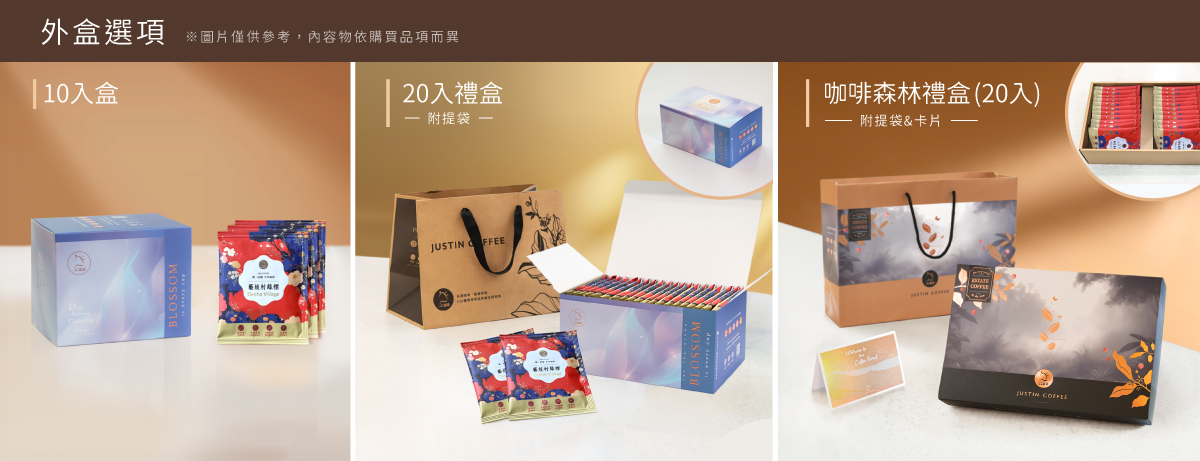
➤Freshly Roasted Coffee Bean Specialty Store
➤CQI Certified Q Grader Quality Assurance
➤Million-Level Coffee Bean Sorting Machine Eliminates Defective Beans
➤Deoxygenated Preservation Process for Drip Coffee



The Elegant Arrival of Geisha Drip Coffee!
Justin Coffee's festive limited edition Geisha drip coffee features the richly aromatic and delicately sweet Gesha Village coffee, as well as the Malawi Geisha with its elegant floral notes and hints of licorice, providing a perfect start to the New Year.
These two Geisha drip coffees come in sophisticated and exquisite packaging, carefully selected and brimming with blessings. This year, present your friends and family with this thoughtfully crafted specialty coffee, offering them a warm and delightful aromatic experience.

※ Coffee Forest Gift Box & 20-Pack Gift Box with Carrying Bag (For 10-Pack Box, please ►purchase an additional carrying bag if needed)
※ Note: A maximum of 5 boxes can be picked up at convenience stores. Additional items cannot be included in the same order.
Information on the two types of drip coffee is as follows:
🔸 Ethiopia Gesha Village Bangi Gori Geisha Washed SINGLE-TERROIR
-----
🔸 Single Estate Drip Coffee- Malawi Misuku Mountain Geisha Washed








Coffee Flavor
The flavors of coffee are derived from the breakdown of various nutrients in the green coffee beans during roasting. Heat causes these compounds to degrade into a variety of aromatic molecular structures, resulting in a wide spectrum of flavors. High-quality coffee beans naturally possess a rich aroma that evolves at different temperatures—high, medium, and low—offering a delightful and nuanced experience worth savoring.
Ethiopia Gesha Village Bangi Gori Gesha Washed SINGLE-TERROIR
Jasmine, Honey, Lime, Juicy Mouthfeel, Delicate & Clean Finish
Malawi Misuku Mountain Geisha Washed
Delicate floral aroma, orange, lemon peel, honey, licorice, spices, with a lemon peel aftertaste

Ethiopia Gesha Village
At Gesha Village, every step of cultivation and processing is dedicated to uncompromising quality. Each batch is marked by rich floral and fruity aromas, characteristic coffee flavor elements, and is carefully graded. Through a rigorous cupping process, each batch is meticulously selected, evaluated using the Specialty Coffee Association (SCA) protocols, and classified according to Gesha Village’s grading system. These batches are then offered to global buyers, ranging from extremely rare treasures to fully traceable single origins. The grading system is as follows:
Gold Label: RARITIES
The Gold Label represents rare treasures, making up only 10% of Gesha Village's total estate production. Extremely scarce, these coffees feature top-tier flavor characteristics, pronounced and lasting aromas, and a refined texture. This grade is where auction lots are selected and is often the first choice of international baristas for competitions.
Red Label: GROWERS RESERVE
The Red Label batch accounts for only 15% of the estate's production. It showcases exceptional flavor and quality, consistently scoring above 88 points on the SCA cupping scale.
Green Label: SINGLE TERROIR
The Green Label batches originate from a single region within the Gori Geisha Village. Each batch has complete traceability, including details such as the farm block name, coffee variety, and processing date.
Gesha Village Coffee Estate in Ethiopia cultivates coffee trees under the shade of the original forest canopy, employing natural shading and intercropping methods to achieve environmental sustainability. The estate aims to be Ethiopia's finest and most environmentally conscious coffee farm, with an uncompromising commitment to quality in every step of cultivation and processing, and a strong dedication to its employees and customers. Gesha Village seeks to connect the world to Ethiopia and reveal all of its beauty within a perfect cup of coffee.
-------------
Malawi
Malawi coffee is known for its unique flavor, rich sweetness, and intense aroma. Local smallholder farmers cultivate coffee using traditional farming methods, resulting in a sweet and delicate flavor profile. The coffee boasts a strong floral fragrance with a distinctive hint of licorice and spices. Malawi is also a member of the Eastern Africa Fine Coffees Association (EAFCA) and actively promotes its coffee at the annual events of the Specialty Coffee Association of America (SCAA) and the Specialty Coffee Association of Europe (SCAE), gradually gaining recognition among global coffee enthusiasts.
Despite financial constraints in its coffee industry, Malawi is gaining attention in the global coffee market. Its Geisha coffee, introduced from neighboring Ethiopia in the mid-20th century, is now primarily grown in Malawi’s highest-quality coffee region, Misuku Mountain. Situated at elevations between 1,700 and 2,300 meters, this region has abundant weathered parent rock, rich in acidity, with deep dark red clay and sandy soils, providing ideal conditions for Arabica coffee cultivation. The annual rainfall ranges between 1,500 and 2,000 millimeters, further contributing to the coffee’s exceptional growth environment.
In Malawi, coffee is primarily grown by smallholder farmers, particularly in the Viphya and Nyika Plateaux regions in the north. The Misuku Mountain coffee-growing area, especially near the Songwe River basin along the Malawi-Tanzania border, is a key region for Arabica coffee production. This region produces high-quality coffee beans, including Agaro and Geisha, which are renowned for their superior quality and high market value. This particular batch of coffee beans undergoes four rounds of meticulous hand selection, ensuring each bean is clean, full, and of the highest quality.

(Geisha/Gesha)
Geisha coffee, once named one of the "World's Top 10 Most Expensive Coffees" by Forbes, is a legendary name in the world of specialty coffee. However, there is significant confusion surrounding the Geisha variety, as several genetically distinct plant types are referred to as Geisha, many of which share a similar geographic origin in Ethiopia. Recent genetic diversity analysis conducted by the World Coffee Research confirms that the T2722 variety cultivated in Panama is both unique and consistent. When well-managed in high-altitude regions, this variety is strongly correlated with exceptional cupping quality and is renowned for its delicate floral aroma, jasmine notes, and peach-like fragrance.
(Gori Gesha)
The Gori Gesha variety is named after the Gori Gesha Forest in Ethiopia's Bench Maji zone. This heirloom variety replicates the genetic diversity found within the Gori Gesha forest.
Regarding the spelling, both "Geisha" and "Gesha" are used interchangeably. The variation arises from transliteration differences, as there is no fixed translation from Ethiopian dialects to English. The coffee was initially recorded as "Geisha" in planting records, and over time, this spelling became prevalent in the coffee industry. However, "Gesha" is closer to the original pronunciation in Ethiopia.
In recent years, the cultivation of the Geisha variety has spread worldwide, achieving remarkable results in various competitions. Countries in Central and South America, such as Guatemala, Costa Rica, El Salvador, Colombia, and Peru, have successfully grown this variety, often transplanting the T2722 variety from Panama. Additionally, regions in Taiwan have begun cultivating Geisha at high altitudes, where the higher elevation often enhances its enchanting flavor profile.
 (Coffee Processes)
(Coffee Processes)
The term "processing methods" refers to the process of transforming ripe red coffee cherries into dried green beans. Each method has its advantages and disadvantages, influenced by the natural environment and the specific needs of the coffee-producing region. As a result, different regions adopt the processing method most suited to their conditions. This batch uses the following three processing methods, described below:
【Washed / Wet Processed】
Also known as the wet process, this method involves removing the skin and pulp of the coffee cherries before drying. The seeds are then fermented in water tanks to eliminate the remaining mucilage on their surface, followed by thorough washing and drying under sunlight or with mechanical dryers.
The washed process produces a cleaner and crisper flavor profile compared to the natural process. Coffees processed this way typically have lighter body, brighter acidity, and distinct fruit flavors. This method is often associated with specialty coffee due to its clarity and vibrant flavor expression.


JUSTIN INTERNATIONAL FOOD ENTERPRISE CO., LTD.
Tel: +886-3-358-6611
1st Floor, No. 30, Lane 120, Daxing Road, Taoyuan District, Taoyuan City
▶This product is covered by a NT$10 million product liability insurance.
▶Food Industry Registration Number: F-165601955-00000-0
▶ Our company’s cupper is certified as a CQI International Coffee Quality Appraiser.



Recommended Products




※ Note: A maximum of 5 boxes can be picked up at convenience stores. Additional items cannot be included in the same order.
※ For detailed shipping and payment information, invoices, overseas ordering instructions, etc., please click here to enter.
